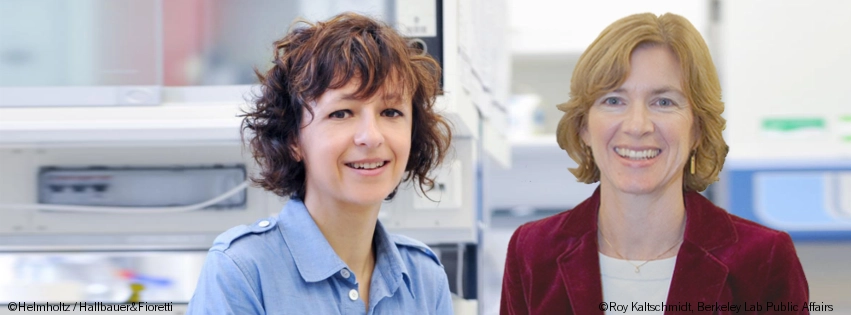Main content
Emmanuelle Charpentier and Jennifer Doudna 2015 Princess of Asturias Award for Technical & Scientific Research

Emmanuelle Charpentier and Jennifer Doudna have gained international recognition for their joint work on a genome-editing technique based on what are known as CRISPR sequences (clustered regularly interspaced short palindromic repeats). The CRISPR-Cas system is an antiviral defence mechanism in archaea and bacteria based on DNA repeat arrays (CRISPR elements) that function in conjunction with Cas nucleases. The teams headed by Charpentier –in Sweden– and Doudna –in the United States– had been independently researching these Cas proteins, associated with CRISPR sequences. In 2012, they published a joint article in Science –2007 Prince of Asturias Award for Communication and Humanities–, in which they showed that the Cas 9 enzyme in Streptococcus pyogenes is able to carry out site-specific cleavage of double-stranded DNA with enormous precision using an RNA sequence that contains a combination of repeats and spacers which guide the Cas protein. This genome-editing technology, which has been further developed and improved, has caused a revolution in the field of molecular biology, in which numerous researchers are applying this method to introduce subtle modifications to the genome at specific loci chosen from a wide variety of cells and cell types. In short, it allows gene inactivation or modification with an ease and accuracy never previously achieved, thereby opening up a wide range of possibilities in the fields of biology and medicine. This technique has been applied to human cells in the laboratory and it has been shown in mice that it can be used to correct genetic defects. This method has immediate potential for use as a tool in gene therapy in humans.
For their studies, Emmanuelle Charpentier and Jennifer Doudna have received, among other distinctions, the Paul Janssen for Award Biomedical Research (USA, 2014), the Breakthrough Prize in Life Sciences (USA, 2015) and the International Society for Transgenic Technologies Prize, which waspresented to them in March 2016 in Prague (Czech Republic) and the Nobel Prize in Chemistry (2020). Time magazine included them in the list of 100 most influential people in the world in 2015.
Emmanuelle Charpentier (Juvisy-sur-Orge, France, 11th December 1968) studied Biochemistry and Microbiology at the Pierre and Marie Curie University in Paris and earned a PhD in Microbiology for her research at the Pasteur Institute. She furthered her studies at the Rockefeller University, New York University’s Langone Medical Center, the Skirball Institute of Biomolecular Medicine in the same city and the St Jude Children’s Research Hospital, in Memphis. She later established her own research group at the Max F. Perutz Laboratories at the University of Vienna and was guest professor at the Laboratory for Molecular Infection Medicine Sweden, at Umeå University. She is Alexander von Humboldt Chair at the Hannover Medical School and Head of the Regulation in Infection Biology Department at the Helmholtz Centre for Infection Research, Braunschweig (Germany). She currently heads the Max Planck Institute for Infection Biology, Berlin.
Jennifer Doudna (Washington D.C., 1964) studied Chemistry at Pomona College in Claremont and obtained her PhD in Biological Chemistry and Molecular Pharmacology from Harvard. She carried out postdoctoral research at the University of Colorado, and taught at Yale between 1994 and 2002. She has conducted research at the Howard Hughes Medical Institute since 1997 and has been Professor at the University of California in Berkeley since 2003, where she also heads the Biochemistry, Biophysics and Structural Biology Division and is the Li Ka Shing Chancellor’s Chair in Biomedical and Health Sciences.
End of main content
